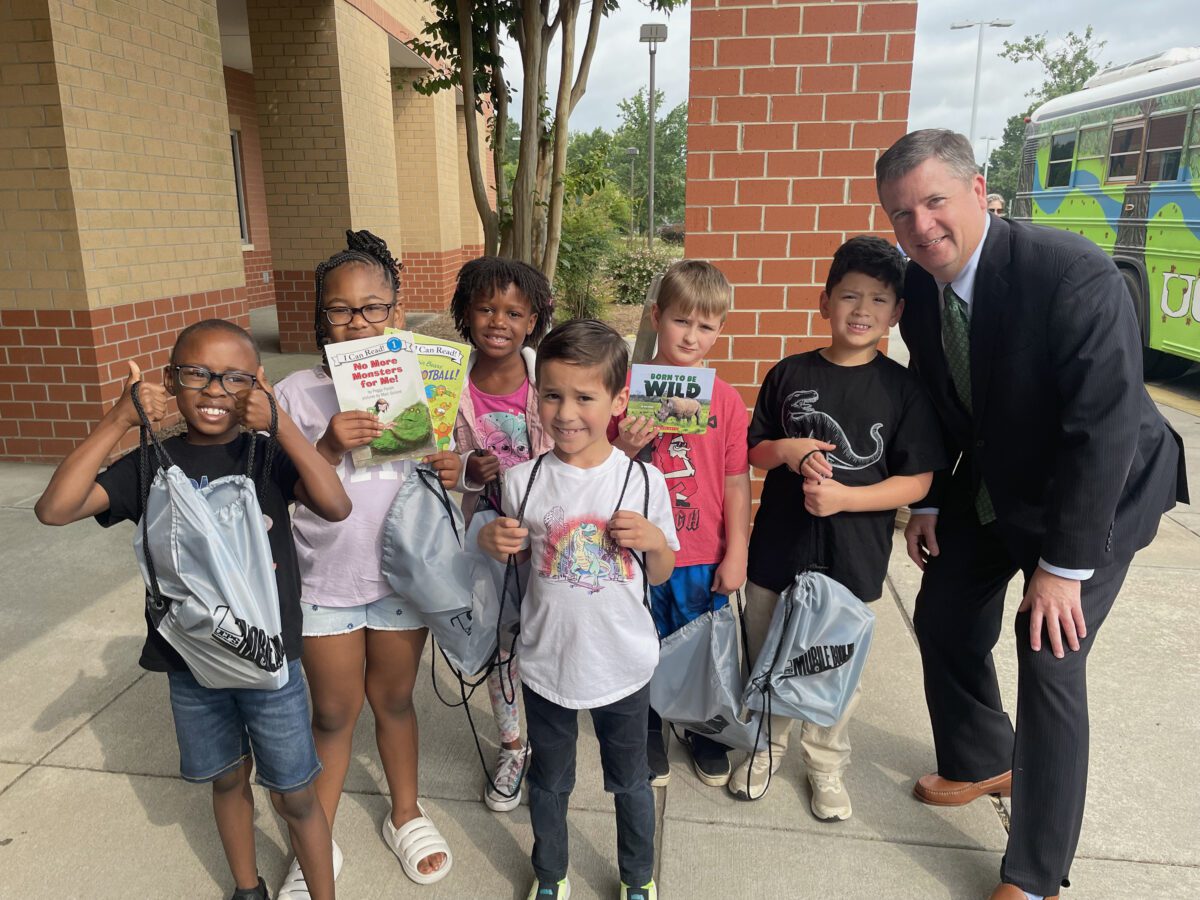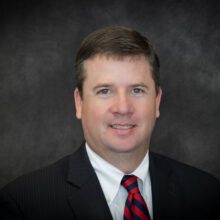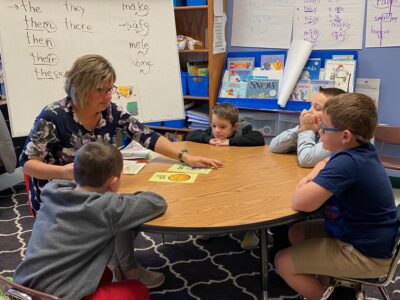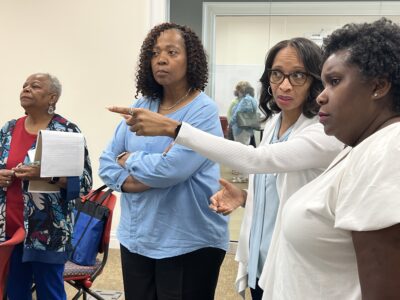
Share this story
|
|
Union County Public Schools (UCPS) has prioritized literacy education, implementing evidence-based strategies and data-driven instruction to empower learners and educators. With a strong emphasis on the Science of Reading, UCPS has shown growth in student literacy proficiency across multiple kindergarten through fifth-grade levels.
Research-based instruction as the foundation
In 2021, the North Carolina Department of Public Instruction (NCDPI) made LETRS (Language Essentials for Teachers of Reading and Spelling) mandatory professional development for elementary school educators. LETRS is evidence-based training designed to enhance reading instruction by providing teachers with practical strategies and tools based on research. UCPS was among the first districts to embrace LETRS, completing all modules in the spring of 2023.
LETRS focused on phonics-based reading instruction and aimed to equip students with essential decoding skills and language comprehension. The professional learning course offered comprehensive knowledge applicable to any reading program. The training, based on the Science of Reading, was approximately 160 hours spread over two years.
LETRS-trained teachers provide students with ample opportunities for foundational reading skills. It includes activities like engaging in discussions and storytelling, which help to promote oral language development. Teachers emphasize decoding skills and incorporate explicit phonics lessons into daily instruction. It helps students understand the connections between sounds and letters to decode words more accurately.
“Empowering both our teachers and leadership through LETRS training has been transformative for our district’s literacy efforts. The investment in equipping our leaders with the same tools as our educators has created a unified approach and has propelled us toward even greater success.”
Superintendent Dr. Andrew Houlihan
A steady climb in student literacy proficiency
UCPS’s commitment to effective reading instruction has yielded impressive results. The North Carolina literacy assessment (mCLASS) for the 2022-23 academic year showed a marked increase in student proficiency across multiple grades. Kindergarten students began with a proficiency rate of 33.9% but made remarkable progress, reaching 79% at the end of the year. First-grade students started at 59.6% proficiency and steadily increased to 79.3% by year-end. Fifth-grade students, who already had a strong starting point at 65.7%, showed continued progress, reaching 71.8% by year-end.
Several schools have shown remarkable growth in literacy proficiency.
At Benton Heights Elementary, a Title I school, the students started the year at a proficiency rate of 29.5%, which increased to 41.4% at mid-year and further soared to 52.6% at the end of the year. This impressive progress reflects a growth of 23.1 percentage points.
Similarly, Marshville Elementary, also a Title I school, has witnessed substantial advancements with their literacy proficiency rising from 39% at the beginning of the year to 49.8% at mid-year, reaching an impressive 65%. This noteworthy improvement equates to a growth of 26 percentage points.
New Salem Elementary also demonstrated commendable progress in literacy, as their students achieved a proficiency rate of 51.9% at the start of the year. It soared to 66.1% by mid-year and climbed to an impressive 72.7% by the end of the year. The school’s growth was 20.8 percentage points.
Furthermore, Shiloh Valley Primary School showed remarkable literacy improvement. The students began the year with a proficiency rate of 43.9%, which increased to 55.2% at mid-year and rose to 66.2% at the end of the year. This substantial gain resulted in a growth of 22.3 percentage points.
Transformed teaching practices and student success
UCPS teacher Cheryl Petroff participated in the training and taught first grade at Shiloh Valley Primary School. She witnessed significant growth in her classroom and the school as a whole. Petroff shared that the training helped her shift her teaching style and mindset.
“We are seeing growth because we are starting at the foundational level and working our way up to teach students to read,” said Petroff.
One shift is Petroff’s use of sound boxes as a visual tool to help students improve their reading skills. Each box represents a sound in a word. Students segment words into sounds and place them in the corresponding boxes. They then blend the sounds to form a word. She provides practice and support, gradually increasing word complexity. Once proficient, students apply this skill while reading, mentally using sound boxes to decode unfamiliar words.
“I had one student who didn’t know all the consonant names or sounds. The student only knew the letter “a.” I started with the sound and symbol exposing her to more vowel sounds and using the sound boxes,” said Petroff. “The student began in the red when assessed, which is low, and ended up in the blue, which is the highest you can reach.”
UCPS takes LETRS training a step further
UCPS has taken steps above and beyond the required LETRS training to build strong and confident readers while empowering teachers with effective instructional techniques.
The first step was to create the UCPS Literacy Vision Team to redefine the district’s vision of literacy. The first goal was to find resources and support to help our elementary teachers take what they had learned and put it into practice in their classrooms consistently. The second was to align the work with existing educational frameworks and standards and involve school principals and support staff in decision-making.
The team set specific goals for each grade level to ensure that literacy activities blend seamlessly into the daily routine. For grades K-2, literacy activities take place throughout the day for 120-150 minutes. Meanwhile, in grades 3-5, focused attention is given to 90-120 minutes of research-backed best practices in literacy.
UCPS also hired literacy teacher specialists across all 30 elementary schools to provide extra support for teachers and students.
“Having a literacy specialist reinforces what I do in the classroom,” said Petroff. “During our professional learning community (PLC) time, we meet as a team to share ideas and collaborate. [LETRS] Training was an unfamiliar experience for us all, but it has provided us with a shared language to communicate with each other.”
Shiloh Valley Primary School literacy specialist Kayme Beverly started at UCPS as a first-grade teacher. She shares the story of her mother to demonstrate that reading skills are nurtured, not innate. Her mother has dyslexia and had a teacher intervene with the same literacy methods now being used in the district. Her mother transitioned from a struggling reader to an avid reader. It’s been a source of motivation for Beverly. She believes any child can learn to read when they receive the proper instruction and support.
“My position shows our focus on literacy. It lets us hone in and practice the methodologies we have learned. It has also led to insightful conversations with teachers who teach all subjects,” said Beverly. “We collaborate with instructional coaches and teachers to analyze student data and determine the reasons behind their performance. It enables us to develop effective strategies.”
Teachers continuously assess student progress and adjust lessons accordingly. Using formative assessments, teachers can keep track of students’ progress and pinpoint areas where they need extra help. This approach provides teachers with data to adjust their lessons and interventions to target specific learning gaps. It also encourages ongoing improvement.
The district has also implemented the Core Knowledge Language Arts (CKLA) curriculum, which aligns with the North Carolina Standard Course of Study. It positions teachers to utilize what they have learned in LETRS training to meet each student’s needs. CKLA offers comprehensive literacy instruction across various subjects, expanding students’ vocabulary and knowledge. It focuses on children’s needs based on research surrounding the Science of Reading. The curriculum includes clear decoding instruction, improved comprehension through background knowledge, contextual vocabulary learning and reinforcing spoken and written language.
UCPS’s ongoing commitment continues
UCPS has made significant strides in improving literacy, recognizing its fundamental importance. However, our efforts are far from complete. We understand there is still much work to do, and we are committed to continuing our progress. The district remains dedicated to implementing innovative strategies, strengthening collaboration and pursuing ongoing improvements. Our goal is clear: to empower learners and educators alike, ensuring that everyone in our community has the opportunity to thrive through enhanced literacy. The journey has only just begun.
“We understand the importance of implementing this work with fidelity, devising strategies, and bridging gaps for ongoing growth. Achieving student success demands proactive assessments to identify weaknesses and craft action plans. Equally vital is supporting teachers and administrators with necessary resources for effective implementation. Through continuous progress monitoring, we can make the necessary adjustments to stay on track.”
Superintendent Dr. Andrew Houlihan





